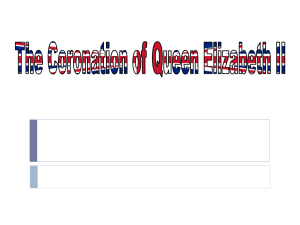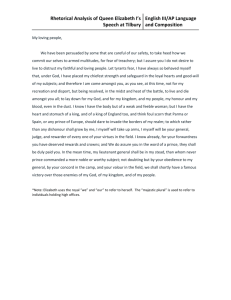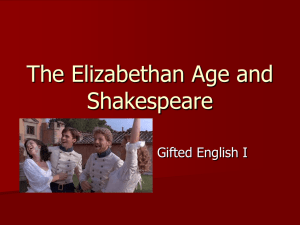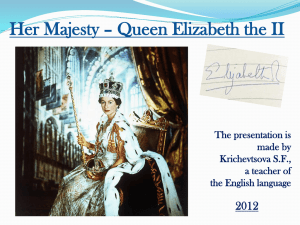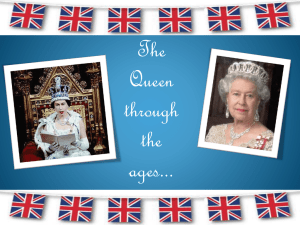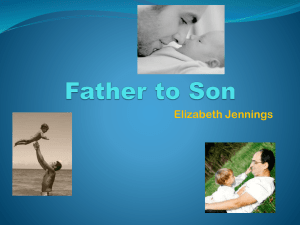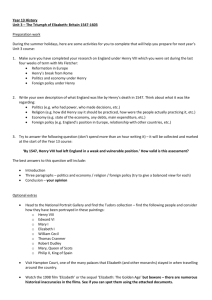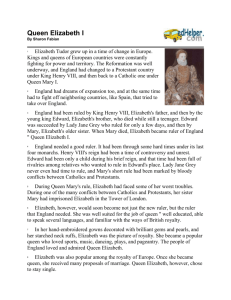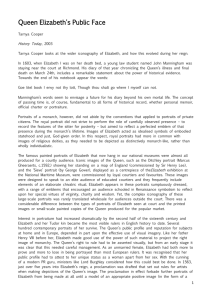British Government
advertisement
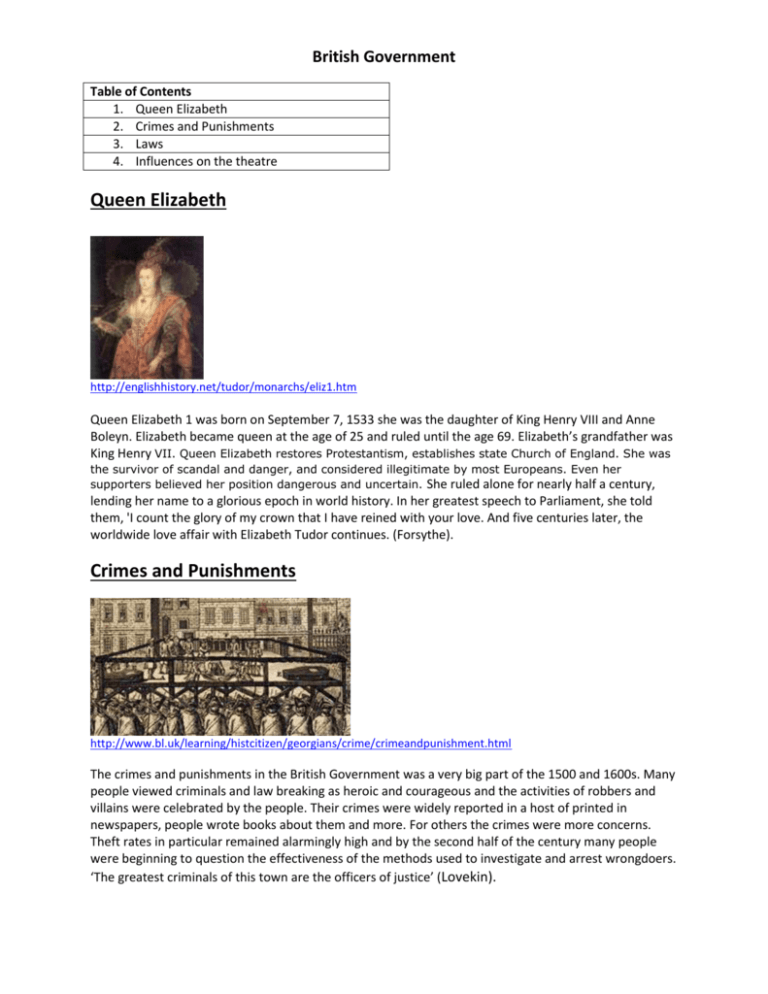
British Government Table of Contents 1. Queen Elizabeth 2. Crimes and Punishments 3. Laws 4. Influences on the theatre Queen Elizabeth http://englishhistory.net/tudor/monarchs/eliz1.htm Queen Elizabeth 1 was born on September 7, 1533 she was the daughter of King Henry VIII and Anne Boleyn. Elizabeth became queen at the age of 25 and ruled until the age 69. Elizabeth’s grandfather was King Henry VII. Queen Elizabeth restores Protestantism, establishes state Church of England. She was the survivor of scandal and danger, and considered illegitimate by most Europeans. Even her supporters believed her position dangerous and uncertain. She ruled alone for nearly half a century, lending her name to a glorious epoch in world history. In her greatest speech to Parliament, she told them, 'I count the glory of my crown that I have reined with your love. And five centuries later, the worldwide love affair with Elizabeth Tudor continues. (Forsythe). Crimes and Punishments http://www.bl.uk/learning/histcitizen/georgians/crime/crimeandpunishment.html The crimes and punishments in the British Government was a very big part of the 1500 and 1600s. Many people viewed criminals and law breaking as heroic and courageous and the activities of robbers and villains were celebrated by the people. Their crimes were widely reported in a host of printed in newspapers, people wrote books about them and more. For others the crimes were more concerns. Theft rates in particular remained alarmingly high and by the second half of the century many people were beginning to question the effectiveness of the methods used to investigate and arrest wrongdoers. ‘The greatest criminals of this town are the officers of justice’ (Lovekin). Laws http://www.britannia.com/gov/gov8.html England and Wales, Scotland and Northern Ireland all have their own legal system. The laws are divided into two different groups’ criminal law and civil law. The distinction between the two branches of the law is reflected in the procedures used, the courts in which cases may be heard and the sanctions which may be applied. Common law, which is based on custom and interpreted in court cases by judges, has never been precisely defined or codified. There’s also equity law the consists of a body of historic rules and principles which are applied by the court. The English legal system is therefore distinct from many of those of Western Europe, which have codes derived from Roman law. (“Crime and Punishment”) Influences on the theatre http://alexryan8x.tripod.com/theatre.html In Shakespeare’s time there were no female actors. This was because acting was not considered an honorable job, so no women would ever be seen doing such thing. The plays that were made in this time period were usually last minute. Some actors usually got their scripts just before the plays. They used a technique called “cue acting” this is when peopled stood behind the curtain and yelled at them their lines. There is a famous stadium called The Globe Theatre. There’s a myth that if two plays were done every day at the same time in there afternoon then it is good luck. The plays can’t end too early in the morning because the sun was too bright, and it can’t be done at night because there is no artificial lighting (“Queen Elizabeth 1: Biography, Portraits, Primary Sources”). Helpful Links http://tudorhistory.org/elizabeth/ In this website you will be able to find helpful information about Queen Elizabeth 1. http://www.eyewitnesstohistory.com/punishment.htm In this website you will be able to find out all the information about the crimes and punishments in the 1500s. http://www.britannia.com/gov/gov8.html In this website you will find out all about the laws in the British government. http://alexryan8x.tripod.com/theatre.html In this website you will find out all about the theatre in the 1500s. Works Citied “Crime and Punishment.” Crime and Punishment during 1500s. 15 January 2013 Forsythe, Judy. “Theatre in Shakespeare’s times”. Theatre in Shakespeare’s Times. 15 January 2013 Lovekin, Shane. “Britannia Panorama: British Government.” British Government. 15 January 2013 “Queen Elizabeth 1: Biography, Portraits, Primary Sources.” Queen Elizabeth 1. 15 January 2013

